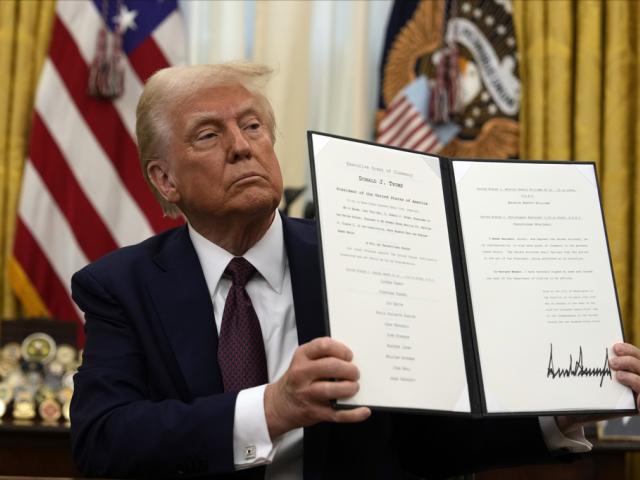As President-elect Donald Trump returns to office, he is setting the stage for a historic immigration crackdown aimed at deporting millions of migrants and closing the border. The estimated $68 billion operation would require unprecedented coordination and resources, raising questions about how it might unfold.
"On my first day back in the Oval Office, I will sign a historic slate of executive orders to close the border to illegal aliens and stop the invasion of our country," Trump recently said.
The southern border remains overwhelmed, with millions of migrants straining resources in border towns and cities across the country with migrants constantly being relocated from the border to urban centers.
***Please sign up for CBN Newsletters and download the CBN News app to ensure you receive the latest news updates.***
\
PHOTO: Migrants walk through Tapachula, Chiapas state, Mexico, Jan. 2, 2025, in an attempt to reach the U.S. border. (AP Photo/Edgar H. Clemente)
Leading the effort will be Tom Homan, Trump's newly appointed "border czar," who plans to mobilize thousands of immigration enforcement agents and redeploy federal resources to apprehend criminals and others with deportation orders.
"We got ICE officers going to be hitting the streets looking for illegal aliens. At the same time, we'll be ending catch-and-release day one," Homan said. "On the same day, we'll be looking for over 340,000 missing children."
READ GOP-Led House Passes Laken Riley Act in Definitive Step to Crack Down on Illegal Immigration
Trump's team also plans to use advanced technology like AI databases to track individuals under deportation orders and military aircraft to transport large groups of migrants to centralized processing hubs.
"They target criminal aliens. They know where they're at, they know what they're doing, and they are able to pick up those individuals in a safe setting," said Chad Wolf of the America First Policy Institute.
Homan defends the controversial idea of deporting parents of young children, saying families would have to decide whether to leave together or face separation. "Their parent entered the country illegally, had a child knowing he was in the country illegally, so he created that crisis," he said.
Some Democratic governors have vowed to resist the administration's plans. Arizona Governor Katie Hobbs said, "It harms communities. That tears families apart. That's just not going to happen on my watch."
Critics argue that sanctuary policies exacerbate the problem. "Sanctuary cities and states refuse to cooperate, creating a cycle where criminal aliens are released back into communities instead of being prosecuted or detained," said Lora Ries of the Heritage Foundation.
Legal battles are likely to emerge, with groups warning of potential civil liberties violations. "We're hearing from some members of the Trump transition team they are only going after hardened criminals and national security threats, and that's one thing," said Lee Gelernt of the ACLU. "And then we're hearing from lots of others they're going to go after people without criminal convictions."
Observers believe the Trump administration is better positioned this time to implement its agenda. "Unlike the border wall where it took 20 months to build one mile of wall, they're really getting started now," said Anna Giaritelli of the Washington Examiner. "I think they learned from the first administration: we really need to make time."
Trump has also pledged to dismantle immigration pathways created under the Biden administration, such as the CBP One app and humanitarian parole programs that expanded legal entry options.
Critics have highlighted the immense cost of the plan, but supporters counter that it would save money by reducing the strain on U.S. resources caused by undocumented migrants.
"You just look at the billions of dollars. It's probably close to a trillion that the administration has spent handling illegal immigration," Wolf said. "That money could be realigned to focus on enforcement and ensuring public safety."
Recent polls show more than half of Americans support some level of deportation, with a similar number favoring pathways to citizenship. As Trump's team prepares to launch this ambitious effort, the country braces for a dramatic shift in immigration policy.
Did you know?
God is everywhere—even in the news. That’s why we view every news story through the lens of faith. We are committed to delivering quality independent Christian journalism you can trust. But it takes a lot of hard work, time, and money to do what we do. Help us continue to be a voice for truth in the media by supporting CBN News for as little as $1.












 Support CBN News
Support CBN News







